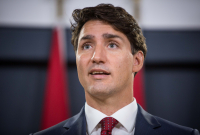Support strong Canadian climate journalism for 2025
Cenovus Energy Inc. chief executive Alex Pourbaix will step down from his CEO role later this year to devote more time to his evolving role as an outspoken champion of Canada's oilsands industry and its decarbonization ambitions.
The Calgary-based energy company said Thursday that Pourbaix, who has led Cenovus since November of 2017, will become executive chair, while chief operating officer Jon McKenzie will become CEO in a transition that will take place after the company's annual meeting set for April 26.
On a conference call with analysts, Pourbaix said the change will allow him to focus his attention on external efforts, including working with all levels of government to advance the oil and gas industry's decarbonization goals.
Cenovus is a member of the Pathways Alliance, a group of oilsands companies that together have pledged to spend $24.1 billion to reduce greenhouse gas emissions from oilsands production by 22 million tonnes by 2030.
Pourbaix has been one of the most outspoken advocates of the Pathways plan and has been heavily involved in the group's efforts to secure federal and provincial support for a massive proposed carbon capture and storage transportation line that would capture carbon dioxide from oilsands facilities and transport it to a storage facility near Cold Lake, Alta.
"Next to safety, there is nothing more important to Cenovus and our industry than reaching a durable solution between government and industry to achieve our emission aspirations," Pourbaix said.
"Once I move to the executive chair position, I intend to dedicate even more time to this pivotal external issue for both Cenovus and our industry."
Pourbaix was one of the prominent industry voices who successfully lobbied the federal government for the creation of an investment tax credit for carbon capture and storage projects in Canada, which was announced in the federal budget last year.
However, he has also been vocal in his stance that more government support is needed before companies will pull the trigger on investing in carbon capture. Pourbaix and other oil and gas sector leaders have said Canada needs to do more to stay competitive with the U.S. and its Inflation Reduction Act, which they say offers more incentives for the technology.
Environmental groups have been critical of the industry's lobbying for more support, given the record profits oil and gas companies earned in 2022 due to sky-high commodity prices.
Cenovus earned $6.45 billion in 2022 compared with $587 million in 2021.
Pourbaix said Thursday that he wants to see the industry, the federal government, and the Alberta government come to some type of "durable" agreement as to what this country's emissions reduction ambitions are. He added that a structure needs to be put in place to make sure the oil and gas sector can achieve those goals while still remaining economically viable.
"I think it's just incredibly important for Canadians that we find a way for this industry to be able to continue to thrive, and the way we're going to do that is by constantly improving our environmental leadership," Pourbaix said.
Alberta Premier Danielle Smith released the contents of a letter to Prime Minister Justin Trudeau Thursday in which she calls for the creation of a minister-led working group aimed at coming up with a coordinated CCUS federal-provincial incentive program.
Smith said Alberta is willing to coordinate a federal CCUS income tax credit with an expansion of the province's current Alberta Petrochemicals Incentive Program (APIP) to include carbon capture projects.
But she said Alberta will not cooperate if Ottawa continues to push ahead with introduction of its proposed Just Transition legislation, or with a pledged federal cap on emissions from the oil and gas sector.
The announcement of the change at Cenovus' executive level came as the company reported a fourth-quarter profit of $784 million or 39 cents per diluted share for the quarter ended Dec. 31 compared with a loss of $408 million or 21 cents per diluted share a year earlier.
Revenue in the quarter was $14.1 billion, up from $13.7 billion in the last three months of 2021.
Cenovus reported total upstream production amounted to 806,900 barrels of oil equivalent per day for its most recent quarter, down from 825,300 a year earlier.
Total downstream throughput was 473,500 barrels per day, up from 469,900 in the fourth quarter or 2021.
On the call with analysts, McKenzie — who joined Cenovus in 2018 from Husky Energy as chief financial officer, and was instrumental in Cenovus's merger with that company — said he expects a smooth transition to the CEO role, with little change in corporate focus.
"Both Alex and I have our fingerprints all over the corporate strategy, and we developed this in a partnership together with the rest of our leadership team," McKenzie said.
Pathways Alliance president Kendall Dilling said in an emailed statement Thursday that he is grateful Pourbaix will continue to devote his energy to the group's ambitions.
“Alex’s contributions to not only the creation of Pathways Alliance, but to our continued efforts to decarbonize our industry’s production, have been monumental," Dilling said.
This report by The Canadian Press was first published Feb. 16, 2023.
Companies in this story: (TSX:CVE)




Comments